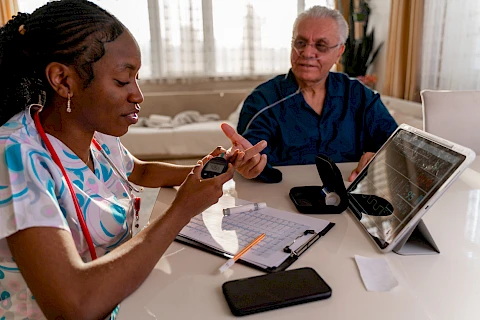
Managing chronic health conditions becomes increasingly important as we age. Diabetes is one of those conditions that require attention, particularly prevalent among seniors. With age, the risk for diabetes complications increases, making it crucial for caregivers to be informed about potential issues. We want to help educate caregivers about the common complications associated with diabetes in seniors, ensuring they are equipped to provide the best possible care.
Common Diabetes Complications in Seniors
Understanding the potential complications of diabetes can help caregivers take proactive steps. Here are some common issues:
- Cardiovascular Disease: Diabetes significantly increases the risk of heart attacks and strokes. Caregivers should be vigilant for symptoms such as chest pain, shortness of breath, or irregular heartbeats.
- Kidney Damage: Diabetic nephropathy can cause swelling in the ankles, fatigue, and changes in urination. Early detection through regular screenings is necessary for successful treatment.
- Foot Problems: Neuropathy and ulcers are common. Regularly checking feet for sores, cuts, or blisters can prevent complications.
Why You Need Regular Check-Ups
Regular check-ups play a critical role in managing diabetes effectively. Healthcare professionals can monitor the progress of the disease and adjust treatment plans as needed. Seniors should schedule routine visits, including eye exams, blood pressure checks, and HbA1c tests, at least two to four times a year. Early detection of any complications can lead to more successful management and better health outcomes.
Monitoring for Symptoms
Caregivers serve as the first line of defense in identifying diabetes complications. You need to monitor for key symptoms such as fatigue, unexpected weight changes, and increased thirst. Keeping a simple log of these symptoms can help track any changes. Caregivers should communicate any significant changes to healthcare providers promptly to address potential concerns early.
Implementing Preventive Measures
Preventing complications involves making informed lifestyle choices and adhering to prescribed treatment plans. Encourage a balanced diet rich in fruits, vegetables, whole grains, and lean proteins. Limiting sugars and processed foods can help manage blood sugar levels. Regular exercise is beneficial. Activities such as walking, swimming, or even gentle yoga can help manage weight and improve overall health. Ensure all medications are taken as directed and remain on schedule. Caregivers can assist by setting up reminders and organizing medications to ensure adherence to the treatment plan.
Supporting Seniors in Managing Diabetes
Helping seniors manage their diabetes involves more than just monitoring symptoms. When possible, allow seniors to participate in their care. This independence can empower them, enhancing their sense of control over the disease. Diabetes management can be daunting, so encouragement from caregivers is crucial. Celebrating small victories can boost morale and motivation to maintain healthy habits. Connecting with local support groups can offer valuable resources and emotional support.
Managing Diabetes With Confidence
By understanding the potential complications of diabetes, caregivers can better support seniors in managing their condition. With proactive care, the risks of complications can be minimized, allowing seniors to enjoy a higher quality of life. With the right knowledge and resources, caregivers can make informed decisions that benefit both themselves and the seniors in their care. For additional support or access to resources, caregivers can reach out to Senior Helpers Harrisburg for assistance in Harrisburg, Camp Hill, Mechanicsburg, Palmyra, and surrounding areas. Remember, being a knowledgeable and caring caregiver is the key to helping seniors thrive.